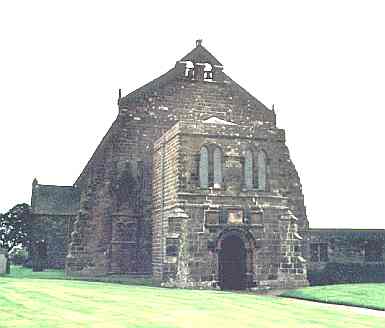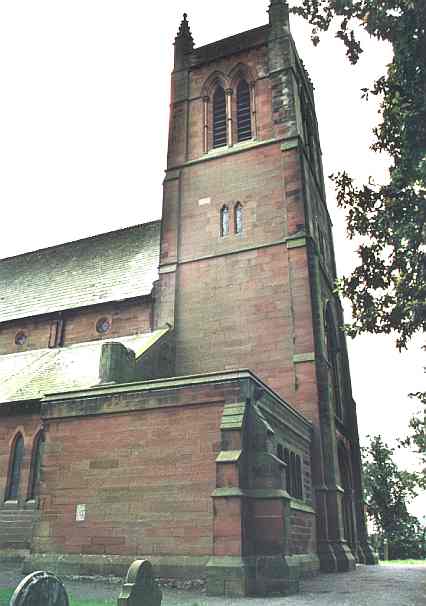CHAP. VI.
Route to Maryport.
We now proceed towards Maryport. The road passes over some extensive commons to the large and pleasant village of Aspatria, and then continues along the northern banks of the Ellen to Maryport. On the right we observe the ground gently swelling into long, humble ridges, running parallel to our present route; beyond which are the flat districts of Abbey-Holm and Kirkbride, bordering on the Frith, which, as well as the mountains of Scotland, are often in full view from the road. On the left, the country rises in one general but easy swell towards the mountains and rising grounds which bind the course of the river Derwent. Here and there we notice a few trees, and regret that no more appear, to shelter and beautify the country: this, no doubt, is the unhappy consequence of those customary tenures which prevail over a great part of Cumberland, and gives to the Lords of Manors a right to all such trees as do not grow in the old hedge-rows; thereby discouraging the practice of planting1.
 On leaving Wigton, our
attention is soon arrested by the appearance of a neat house at Blencogo, on our right.
This was the seat of the late Rev. Mr. Boucher, which he erected on his paternal estate. A
few miles beyond this are the ruins of Holm Cultram Abbey, once a large monastery of
Cistercian Monks, said to have been founded about the year 1150, by Prince Henry, son of
David King of Scotland. The Abbots of this religions house were so much noticed by the
Sovereigns of England, that, in the reigns of Edward I. and Edward II. they were summoned
to several Parliaments. Little remains now of the ancient edifice, beside what has been
converted into the parish church. Here a large bay is opened from the Frith up the channel
formed by the united streams of Wampool and Waver.
On leaving Wigton, our
attention is soon arrested by the appearance of a neat house at Blencogo, on our right.
This was the seat of the late Rev. Mr. Boucher, which he erected on his paternal estate. A
few miles beyond this are the ruins of Holm Cultram Abbey, once a large monastery of
Cistercian Monks, said to have been founded about the year 1150, by Prince Henry, son of
David King of Scotland. The Abbots of this religions house were so much noticed by the
Sovereigns of England, that, in the reigns of Edward I. and Edward II. they were summoned
to several Parliaments. Little remains now of the ancient edifice, beside what has been
converted into the parish church. Here a large bay is opened from the Frith up the channel
formed by the united streams of Wampool and Waver.
On the left, within the course of three miles, stand the old, neglected mansions of Crookdake-hall, Weary-hall, White-hall, and Harby-brow. White-hall, however, has undergone some repairs and improvements by the present owner, William John Charlton, Esq. At a little distance, before we reach Aspatria, the road conducts us close past the deer-park of Brayton Hall, the principal seat of Lady Lawson. The mansion, as well as the adjacent grounds, have been much improved by the late Sir Wilfrid Lawson, who laid out extensive botanic gardens, collected a most valuable library of books, prints, and paintings; and whose love of the arts, guided by an excellent taste, whose spirit of improvement, liberality, hospitable disposition, honourable principles, and gentlemanly manners and character, have made his untimely death to be felt as a real loss to this county.
Isel-hall, on the banks of the Derwent, about six or seven miles south from Brayton, is another old family seat of the Lawsons. It stands low, in a very pleasant vale, near the brink of the river, with deep woods climbing up the heights behind, and the verdant hills of Embleton ascending in front, on the opposite side of the water.
 Aspatria is a long straggling village,
standing on a sandy ridge, which slopes from each side. Many of the houses are good, and
pleasantly situated, commanding an extensive view. In June, 1790, a singular discovery was
made by Mr. Rigg, of this village. Removing the earth which formed a small mount, or
barrow, called Beacon-hill, about 200 yards north of the village, a human skeleton
appeared in a sort of a rude vault or kistvaen, formed with two large cobble stones on
each side, and one at each end. This skeleton measured seven feet from the head to the
ancle2 bone; the feet were decayed and rotted off, and the
other bones, though at first they appeared perfect, soon mouldered to dust when exposed to
the air. On the left side, near the shoulder, was a broad sword, five feet in length, the
guard of which was elegantly ornamented with inlaid silver flowers. On the right side lay
a dirk, or dagger, one foot and a half in length: the handle appeared to be studded with
silver. Part of a gold fibula, or buckle, and an ornament for the end of a belt (a piece
of which adhered to it), were also found there; as were part of a battleaxe, a bit, and a
spur; but much corroded with rust. On the stones were various emblematical figures in rude
sculpture; though some of the circles were exactly formed, and the rims, and crosses
within them, cut in relief. The learned antiquary, Hayman Rooke, Esq. from whose account
we have chiefly extracted the above, supposes the person here interred to have been a man
of considerable rank, and that he may have died about the beginning of the seventh
century, on the dawning of Christianity.
Aspatria is a long straggling village,
standing on a sandy ridge, which slopes from each side. Many of the houses are good, and
pleasantly situated, commanding an extensive view. In June, 1790, a singular discovery was
made by Mr. Rigg, of this village. Removing the earth which formed a small mount, or
barrow, called Beacon-hill, about 200 yards north of the village, a human skeleton
appeared in a sort of a rude vault or kistvaen, formed with two large cobble stones on
each side, and one at each end. This skeleton measured seven feet from the head to the
ancle2 bone; the feet were decayed and rotted off, and the
other bones, though at first they appeared perfect, soon mouldered to dust when exposed to
the air. On the left side, near the shoulder, was a broad sword, five feet in length, the
guard of which was elegantly ornamented with inlaid silver flowers. On the right side lay
a dirk, or dagger, one foot and a half in length: the handle appeared to be studded with
silver. Part of a gold fibula, or buckle, and an ornament for the end of a belt (a piece
of which adhered to it), were also found there; as were part of a battleaxe, a bit, and a
spur; but much corroded with rust. On the stones were various emblematical figures in rude
sculpture; though some of the circles were exactly formed, and the rims, and crosses
within them, cut in relief. The learned antiquary, Hayman Rooke, Esq. from whose account
we have chiefly extracted the above, supposes the person here interred to have been a man
of considerable rank, and that he may have died about the beginning of the seventh
century, on the dawning of Christianity.
Warwick-hall, now a farm-house, stands a mile northwards. - Arcleby3-hall is situated about the same distance to the south. This small, agreeable seat, with the estate and manor, is the property of Thomas Lawson, Esq.
At a small distance from Arcleby we see the rectory-house of Plumbland, standing in a conspicuous situation. This neat and genteel building was erected by the late worthy rector, the Rev. John Bird, who was also at a considerable expence in beautifying and improving the grounds in its vicinity. The views from this house are extensive, and remarkably fine. It is now inhabited by the Rev. Edward Stanley, the rector.
A little farther south we notice the old mansion of Warthol-hall, now let to a farmer, and in a ruinous state. This was long the residence of the Dykes family, and is still their property.
On the other hand, Hayton-castle, the property of Mrs. Jolliffe, stands on a gentle eminence, at the east end of the pleasant village of Hayton, and commands a very extensive prospect over the Frith and Irish Sea as far as the Isle of Man; and also the borders of Scotland. The vicinity of this house is adorned with a few tall old trees.
Allonby is a small market-town, on the sea-coast, mostly inhabited by fishermen, who abundantly supply our markets with cod and other white fish. It stands on a flat, naked shore; but is neat and well-built, and is a place of great resort for bathing, for which it is well adapted. - At some seasons, the herring fishery here is very productive: at other times this fish entirely leaves the coast. This extraordinary circumstance in the natural history of the herring is thus noticed in the History of Cumberland:- "After remaining in this channel ten years, the wonderful shoals of this fish are said to leave it, to stay away ten years, and then return and stay ten years longer. Their revolutions are described to be as regular as those of any of the planets, the flowing of the tides, or the vicissitudes of the seasons. Unaccountable as this circumstance confessedly is, it is confidently affirmed, and by very credible authority, to be a fact, and to have been observed of the herring for three successive periods yet within memory."
Tallentire-hall, the much improved seat of William Browne, Esq. stands on a rising ground between the rivers Ellen and Derwent, opposite Cockermouth. A little lower down, and nearer the latter river, we see Dovenby-hall, the seat of Joseph Dykes Ballantine Dykes, Esq. - The village of Dearham, where there is a large manufactory for making course earthen ware, stands on the opposite side of the water. On the same side of the river, we observe Unerigg-hall, a small but delightfully-situated mansion of John Christian, Esq. And before we reach Maryport, the road leads us past Nether-hall, the seat of Humphrey Senhouse, Esq.
MARYPORT is a neat, modern, well-built sea-port, and situated at the mouth of the river Ellen. The streets are open, and the situation healthy. It has a weekly market on Fridays. Within the last 50 years this place has risen to importance; being, before that period, the resort of a few miserable fishermen, who had a few huts along the beach. The coal trade was the chief staple of this part of the county, and during the present war4, the shipping has embarked much in the transport and timber trade. The works of an iron furnace, ship-building, salt-works, a pottery, a glass-house, a cotton mill, and extensive muslin-manufactories, (carried on by Messrs. Bouch and Tolson), have added much to its population. But, unfortunately, about a year ago, the cotton mill stopped, which has been of great injury to the town. This place is greatly resorted to in the season for sea-bathing; and the herring and white fishing is here carried on to a considerable extent.
Jollie's Cumberland Guide & Directory 1811